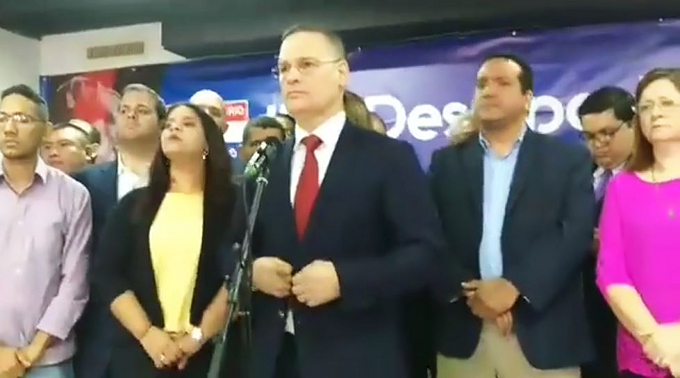
PRD claims to have proof — the votes,
however, may be a different matter
by Eric Jackson
Late on the afternoon of December 6, perhaps on the last reasonable news day before a long holiday weekend, the Democratic Revolutionary Party gathered the faithful with reporters for a press conference about the general situation in Panama. The legislature has been out of session since the end of October and December 8 was Mothers Day here, which is surely a big part of the explanation of who was not there. Not in the picture were many members of the PRD legislative caucus, nor contenders for the party’s 2019 presidential nomination, nor leading figures in the factions that González defeated to win his current party post.
The big takeaway from the discussion was that González maintained that the PRD has all of the necessary legal proofs to start a criminal investigation of President Juan Carlos Varela for accepting illegal campaign contributions from the notorious Brazilian construction conglomerate Odebrecht. About that González is surely right. However, when it’s the president it’s not a court case. Such a matter would have to be investigated, prosecuted and tried by the National Assembly. Under Panama’s current constitution, the relevant question is whether the votes would be there to move against the president.
If all other parties in the legislature ganged up on Varela, his Panameñistas would not have the votes to stop or much delay an investigation that could lead to an impeachment and criminal trial. However, with his party teaming up with dissidents from both the PRD and Ricardo Martinelli’s Cambio Democratico, there is a functional majority in the legislature that gives Varela more or less what he wants. Plus, as to both the Odebrecht and now the Blue Apple cases, all indications are that the present administration and the previous two were profoundly involved in bribery and graft to favor players in the construction and finance industries. PRD members were on the take as well.
González may have fired the first propaganda shot of the 2019 election cycle, but how serious was he as a legislator?
Two days earlier, Varela announced that “sometime after December 15” there would be a special legislative session. There almost has to be, as two Supreme Court magistrates, Oydén Ortega and Jerónimo Mejía, end their 10-year terms on the high court as of December 31. That is, unless replacements have not been ratified. But when that happens there tends to be a brief period when no business of consequence is done at the court until the scheduled replacements are made, even if the old magistrates remain in office and draw salaries until the new ones take office.
On Mothers Day — when hardly anyone was paying attention — Varela announced that the special session to ratify Supreme Court nominees would begin on December 18. He did not say who those nominees would be. The president also declared that as he is president and not a candidate he will not answer any of González’s assertions, nor the published reports and sworn testimony about Odebrecht money flowing into his 2014 campaign via the party insider and erstwhile diplomat Jaime Lasso. Lasso says that the Panameñistas got $700,000 from Odebrecht, but the PRD is claiming that the figure was more like $12 million.
If the PRD has the votes to start a criminal investigation in the legislature, one would expect that they have the votes needed to block Varela’s nominees, whoever they might be. But some anti-corruption activists suggest that the game that González is playing is not about running Varela out of the presidency but about getting someone from the PRD appointed as a magistrate or alternate. With the exit of Ortega and Mejía and their suplentes the PRD will be fresh out of people on the high court if no such deal is struck.
The more innocent explanation is that González is positioning his party as “the real opposition” — as against a Cambio Democratico slate. The latter will likely be dismissed as mostly a bunch of thugs running for office just to get candidates’ immunity from investigation and prosecution but no longer a serious alternative to win control of the government. Ricardo Martinelli’s appeal of a federal magistrate’s extradition order will be heard on January 9 and if he loses he might be expected to appeal to higher courts. Meanwhile the former president and first lady have declared themselves to be candidates for party president and vice president respectively, which gives them fresh layers of immunity. Ricardo Martinelli has made noises about running for mayor of Panama City in 2019.
~ ~ ~
These announcements are interactive. Click on them for more information.











